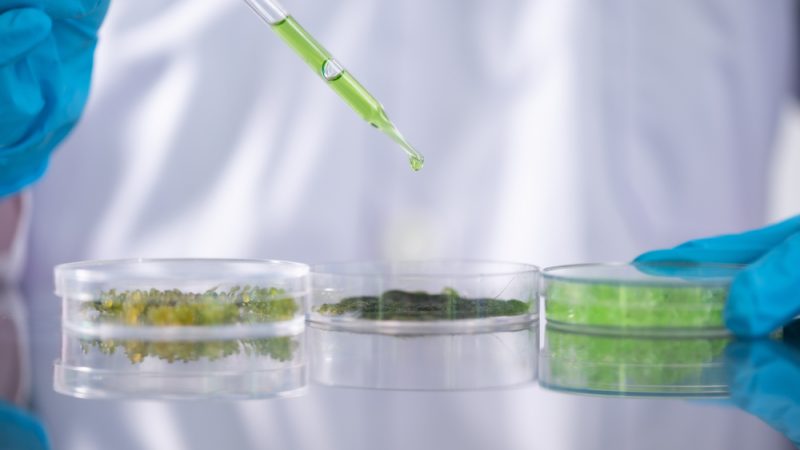Give biosolutions a sandbox. Not for free play, but to work in when the regulatory framework is not geared to give their innovative, radical proposals for solutions a fast and professionally sound chance to get to market in the EU.
Biosolutions are products and solutions that are produced using biotechnology. That is, living microorganisms such as bacterial cultures, fungi, algae, or their products.
It can be used to produce sustainable solutions to be practically applied to other industries' production processes and as final products to enable sustainable development. In everything from food to truly sustainable textiles.
But biosolutions are a new field of research that too often encounters too many unfair and unreasonable hurdles for approval of their solutions. Solutions that are, for example, far better than the chemistry used for necessary plant protection. Better because they don't harm the environment in nearly the same way as chemicals and because several of the biological technologies can provide higher protein yields per hectare.
The latter is damn good for both nature restoration and the world's increasing need for a protein-rich diet to sustain a growing population which we can’t have eating as much meat as recent generations - or starving to death.
Biosolutions technologies must, of course, be approved before use. Preferably in the EU first out of all the places in the world, so we can benefit from them as soon as possible. Especially when the solutions are developed by European researchers and innovative companies.
Right now getting approved is just too slow in the EU and therefore takes about 3 times as long as in the US. There, an approval can be made in about 2 years. In the EU, it takes about 6 years - sometimes even longer.
As I understand it from the companies, head-shakingly bad excuses are lined up when explaining the application time. Explanations are offered such as: "We've just moved to new offices and don't have time to process the application" or "We have too many tasks already and are short of staff" or the more sophisticated: "We only accept applications for active substances where we are already a rapporteur country".
The latter is really stupid because it's the equivalent of a child being refused a place in a school because the family has never had a child in that particular school before.
Approval procedures in the EU not transparent
Approval procedures in the EU are overwhelming, confusing, and not transparent at all. For those who need them and those who give them.
Add to this the lack of qualified specialists to assess new biotechnologies. The perception is that the EU itself does not understand its system.
If you get in touch with the authorities, they ask for a lot of information but don't proactively come back with a decision or the mind-set for active collaborative. Even after a number of years, they keep asking for more information and it's hard to assess if and how it's actually useful. This kills companies and it kills innovation.
One of the biggest problems with the approval process in the EU is that countries share the task. Each new technology has its own country of approval (rapporteur country), regardless of whether that country actually has the technical and administrative competencies available. The principle that we in the EU delegate tasks to each other is beautiful and logical in theory.
The problem is that when it comes to approving new solutions with new ingredients, not all countries have the necessary level of competency. And they never will.
The approach is simply mistaken and directly counterproductive for the EU to attract new inventions, products, companies, and investments. And this applies to all parts of the process from the laboratory to the farmer's machines.
The potential is, for example, machines that run fewer times on fewer hectares because what is put into the soil is more resilient to the climate, less harmful to the environment, and gives more yield per surface area.
This is where the EU needs to learn from the US, where things are moving much faster. The approval process is centralised and easy to understand. Yes, the US is not so fussy about the "precautionary principle". This means that more risks are taken by putting solutions on the market that are not as thoroughly researched as in the EU.
We don't need to take that approach. The fact that the EU has high requirements for safety and quality is often attractive on the world market as the "gold standard". But if the price of unnecessarily long and cumbersome approvals is that the solutions come to the European market as the last place in the world, we are not doing the next generation any favours.
So create a regulatory sandbox for all those solutions where the usual manuals and current legislation don’t apply. A sandbox that can tailor conditions for testing and market approval of everything we can't even imagine right now. It doesn't make sense for the EU to have a strategy to be the most innovative region in the world if we can only approve new solutions if they look like the old ones.
Proposing a regulatory sandbox is nothing new. Many pro-business politicians have done it before me. But it is only now that there is a concrete and workable proposal on the table.
The European Commission's proposal for a new pharmaceutical regulation includes a qualified and serious proposal. It gives the European Medicines Agency and the European Commission the task of describing, facilitating, and monitoring a sandbox for the assessment and approval of an innovative medicine that cannot be put into the usual, known boxes.
Make a copy-paste of that model for biosolutions. That’s it! Make the EU faster than the others without compromising safety and quality, for the benefit of us all. Solving hard problems doesn't have to be hard.


